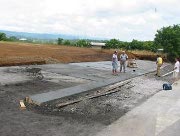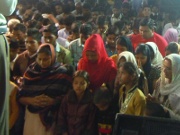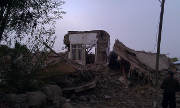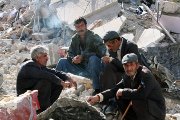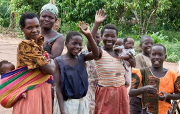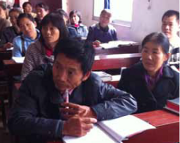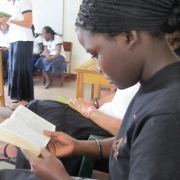By Jerry Wiles,
President Emeritus, Living Water International
Special to ASSIST News Service
HOUSTON, TX (ANS) -- A growing number of ministry and mission leaders, focused on reaching and making disciples in the global community, are coming to realize the importance of understanding worldview, culture and learning styles. In light of the fact that the majority of people in the world have always been, and still are, oral learners (by necessity or by preference) a new dynamic is taking place in the world of evangelization and mission strategy.
 |
Jerry Wiles teaches aboard the boat that served as one of the locations for an Orality Training Workshop on the Amazon River in Brazil. (Courtesy LWI). |
Living Water International, over the past few years, has implemented a simple, basic disciple making strategy that is having a significant impact in Africa, Asia, Central and South America and even in the United States. LWI is discovering that orality (oral disciple making) methods are universal and transferable to every part of the world and to all people groups. In fact, oral methods and strategies are much more transferable from developing countries to the west, than western, highly literate styles of communication are from the west to the rest of the world.
A cross-cultural evangelist in Africa said, “When we go to communities with our Bibles and literature, they want to run us out or argue with us. But now, when we go and make friends, tell stories and ask questions, people want to receive Jesus and follow Him.
A woman who attended an LWI Orality Training Workshop in Central America, said that she felt renewed and refreshed, because this is how she learned about Jesus as a little girl. She went on to tell of her father, who is now more than 100 years old, using story methods of presenting the gospel and teaching biblical truths. She was excited to rediscover that these methods still work today.
 |
Training session in Quito, Ecuador. (Courtesy LWI) |
LWI’s “Orality Training Workshop: An Introduction to Contextual Bible Storying” has now been attended by more than 4,500 people in 18 countries over the past three years. Amazing feedback has come from those who have received the training. We have observed certain patterns everywhere we have conducted this training, whether it’s in a slum area in Guatemala City, a village in Asia, the rainforest of the Amazon basin, remote areas in Ethiopia or on a university campus in Houston, Texas. Telling stories and asking questions seems to be acceptable, well received and life changing everywhere around the world.
Over and over we hear pastors saying things like,
“This orality method levels the playing field so that everyone can be a part of spreading the Good News of Jesus.” A pastor in Central America said, “I see how this is a method I can use to equip and mobilize story-telling evangelists, regardless of their education or age.” We are finding that even children as young as six years of age can learn and retell the stories.
We emphasize that storying and oral disciple making methods are not intended to take the place of other methods, but to give additional resources for one’s ministry and mission tool box. Bible translation work, Bible and literature distribution and literacy training are all important. Orality can be a bridge until people have the Scriptures in their heart language and learn to read it with comprehension.
We must recognize that there may be those who will never have the written Word available in their language or may never learn to read it. However, they can still come to a personal relationship with the living Christ, regardless of their education level or economic condition.
Supernatural Work of the Holy Spirit
The spiritual and relational aspects are vital and should not be overlooked if our orality strategies are to be effective. It’s more than just words and information, but an impartation of the life of God by the Spirit of God that produces lasting and eternal fruit. The availability of technological resources is also a great blessing in the orality movement; radio, television, internet, cell phones and the many digital recording devices are useful in many cases. However, there is still a need for a life-style demonstration of the character of Christ expressed in tangible and relational ways, in addition to the transfer of knowledge about Him.
One LWI staff member in Nicaragua, who had participated in an orality training a few months earlier, shared how she was using stories while doing hygiene training at water projects. She was excited at how children were so receptive and eager to learn more. When she told a story, the children would say, “Tell us another story.” After telling three different stories, she told the children it was time for them to tell a story. She was amazed and surprised that they were able to retell them accurately.
 |
Storying in Africa. (Courtesy LWI). |
Recently in an orality training workshop in South Asia, a pastor testified that learning the story of Nicodemus made him aware that he was in the same condition.
He said he was religious, but lost. He had been a pastor for several years, but during the workshop he said he came to realize he had never been born again of the Spirit of God. There was great amazement and joy among the other 70 pastors as he shared how he had trusted Christ and had peace and joy he had not known before. We observe over and over again how the Holy Spirit brings revelation and understanding in the process of learning and discussing stories about Jesus.
A pastor in Asia, who served as a translator during two orality training workshops, told us he had been using stories to present the gospel for more than 35 years. He had also been an evangelist and church planter for many years. After the workshops, he realized that what had been missing in his previous approach was the engagement, the use of questions, discussion and retelling of the stories. He saw how he could make reproducing disciple makers using orality strategies, in addition to presenting the Gospel. After experiencing the orality training as an interpreter/translator, he recognized the power of simplicity and reproducibility.
A church leader in Central America observed that the non-literate church attendees always sat in the back of the church for fear of being called upon to read. He was so excited to learn and use methods that allow everyone to engage and participate in the worship and equipping times.
Overcoming Skepticism
 |
Trainee telling stories in a village in East Africa. (Courtesy LWI). |
One of the things we are experiencing in various places is some skepticism and negative attitudes among some pastors and church leaders, especially those with more formal academic training. However, for those who will listen, learn and participate, there seems to be a real turn around in their thinking. The negative attitudes fade away as they see the joy and excitement among their people. They gain an appreciation for orality when they observe and experience it first hand. We continue to see the value of demonstration, participation and explanation, in that order.
The stories and testimonies of how the Lord is using orality are quite compelling. Now there are a growing number of case studies and documented results that are very convincing to anyone who takes the time to examine the evidence.
Not everyone receives and responds with equal enthusiasm and passion. It shouldn’t surprise us, in light of the fact that not everyone responded to the Lord Jesus in a positive manner. From the Parable of the Sower in Mark 4, we learn that only one out of four people will respond and produce fruit -- some 30, some 60 and some 100-fold. The seed represents the Word of God, the soil represents the hearts of men (and women) and the sower represents the messenger. It’s the good seed that tests the soil.
The word Gospel comes from an old English word that means “Good Story”. It is encouraging to realize that God will use each of us to be effective as we share the Good News of Jesus in the power of the Holy Spirit and as we seek to make disciples in the mission field where we live and work. All of us who follow Jesus are really on mission with God. I often remind people that we all live in a mission field, made up of our families, neighbors, co-workers and friends; and, there is one more I call “all others”--those short encounters wherever we are. They just may be opportunities to ask questions or tell stories that result in transformed lives.
We often hear people expressing their amazement that something as simple as stories and questions can have such a powerful impact and bring immediate change in people’s lives. A church leader, who oversees a large number of churches, shared that he sees how this orality training will greatly increase their effectiveness, not only with outreach, but with disciple making, leadership training, church planting and mission strategies.
A business professional, who participated in an orality training workshop in Houston, said, “I have participated in many seminars, conferences and training events over the years, but this workshop is by far the most helpful I have ever experienced.”
Relationships and Community
One of the fringe benefits of orality-based communication methods is relationship building and the development of community. An orality training workshop was conducted with a group of senior adults in a church in Texas. Among the 25 people attending the workshop, most had been attending the same church together for 25 to 30 years and felt that they knew each other fairly well. Toward the end of the workshop, the whole group was in tears as they shared with each other about the storms of life and the spiritual transformations they had experienced over the years. Even though they had attended church and worshiped together for many years, they had never shared on a heart level as they did that day. The stories and questions created an amazing opportunity they had never experienced before.
One of the things that make our Great Commission opportunities so significant is the wide variety of resources available to us today. We have available to us the tools of the age -- the many communication technologies, i.e. print, electronics, transportation, etc. But, we also have the tools of the ages -- prayer, personal witness, the Word of God, the work of the Holy Spirit. It is important to realize that God uses any and all means and methods to carry out His eternal purposes.
Having done orality training in a number of churches in the United States, in addition to Asia, Africa and Latin America, we’ve seen pastors and church leaders come alive with new insights and vision for new possibilities. An older pastor recalled that as a young boy, he learned the Bible and spiritual lessons by listening to his father and uncle tell stories. Another pastor decided to start using orality in their outreach by creating community storying-discussion groups. And a Sunday School teacher saw how oral disciple making methods would be far more effective than the literate, conventional methods she had been using.
Missionaries and church planters working in remote villages in the rainforest or those working among nomadic tribes immediately recognize the value of orality. They often see dramatic results when they begin putting their training into practice.
We like to emphasize -- and people are relieved and encouraged when we tell them -- that they don’t have to be great story tellers, because we have “great stories” to tell. People come alive with new excitement when they experience the power of the story and realize that God honors His Word and transforms lives by the work of the Holy Spirit.
When considering the most ancient ways that people have learned and communicated for thousands of years, and what the most universal and transferable methods are, we can appreciate how important orality and storying is to advancing the Kingdom of God.
One of the things we like to point out is that our best model in all of history -- as a leader, communicator, teacher and disciple maker -- is Jesus. It seems to be a real eye opener to many when we emphasize that what He did then, will work here and now. What we learn from studying the life and teachings and Spirit of Jesus will work anywhere and at any time. In reality, Jesus Himself is the only true disciple maker. But the amazing and wonderful thing is that He is prepared to reproduce His life in and through each of us as we make ourselves available to Him. We get to be His channels, His instruments of communicating His truth and life in making disciples.
Simplicity and Reproducibility
When people truly become disciples of Jesus, they belong to Him and He is able to grow them in grace and knowledge of Him. We get to be stewards and servants on the journey.
We often hear pastors and leaders saying, “This is so simple, why didn’t we think of this?” We sometimes refer to this as a “BFO” (a blinding flash of the obvious).
Orality strategies also enable disciple makers, evangelists and church planters to cross the language barriers more quickly than in literate styles of communication. Conducting bilingual training (English and a gateway language) allows for the stories and methods to be immediately used in other languages and dialects. Stories are learned in one language and immediately told in another; and some of those attending the training speak 4 or 5 languages.
Someone has wisely said that there are only two things here on earth that will last forever; the Word of God and people. For many, the Word of God means the Bible. While the Bible certainly is God’s Word written, in most places in Scripture the Word of God is not referring to a written document. The Word of God was around a long time before anything was written, according to John 1:1.
God has inspired and preserved His Word in written form over the centuries, and we are blessed to have it available and be able to read it for ourselves. However, today and throughout history, most of the people of the world have not had the privilege of reading and understanding it for themselves. Most people have come to Christ through personal witness, oral communication or some form or expression of the Good News of Jesus other than the written Word.
After participating in one of LWI’s Orality Training Workshops, a missionary serving in Central America said, “This is revolutionary for our region.” This is in an area there is a lot of human trafficking, drug dealing, witchcraft and demonic activity. A woman in the workshop in the area, after hearing the story of the demon-possessed Gerasene, said, “I am like that man, I need help.” A few men and women in the workshop took her aside and prayed with her, taking authority over the evil spirits. It was later discovered that the woman had gone to a witch doctor and made a pact with Satan in a ceremony that included cutting her wrists.
This experience was an amazing reminder and confirmation that Jesus still delivers, heals and transforms people today. He is the same yesterday, today and forever. We should continue to remind ourselves that the Holy Spirit is still sovereign and works out His purposes in spite of our failures and short comings.
______________________________________________________________
Jerry Wiles is president emeritus of Living Water International. He has served in various roles in ministry and missions over the past 35 years. Jerry currently serves on the Advisory Council of the International Orality Network and conducts Orality Training Workshops and trains trainers in disciple making strategies. He is the author of several books, the most recent, No Greater Joy: Power of Sharing Your Faith through Stories and Questions (Whitaker House).
